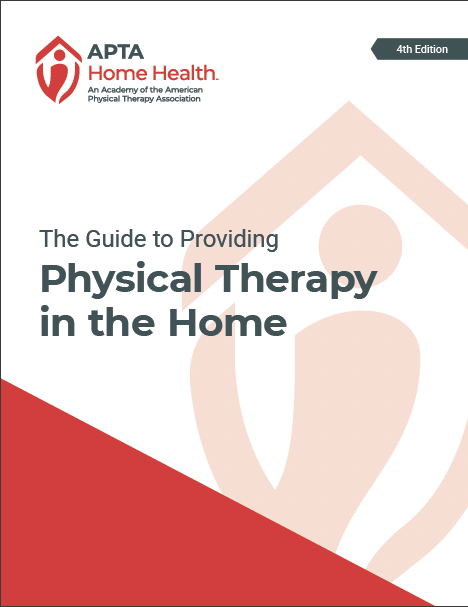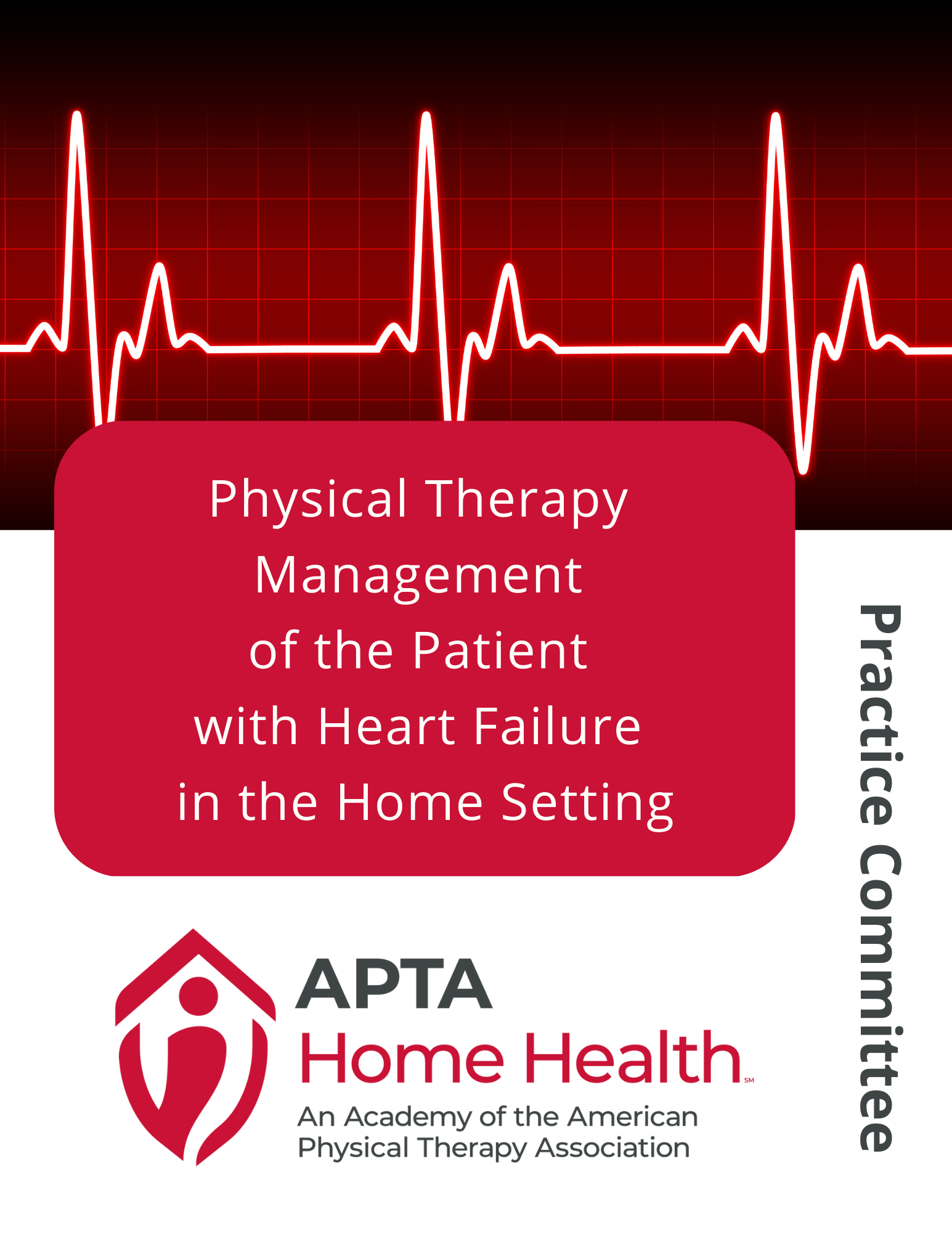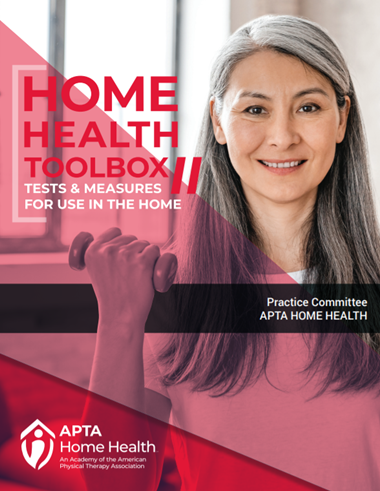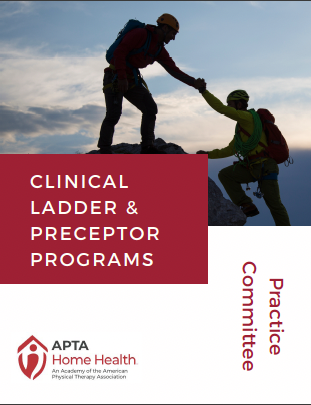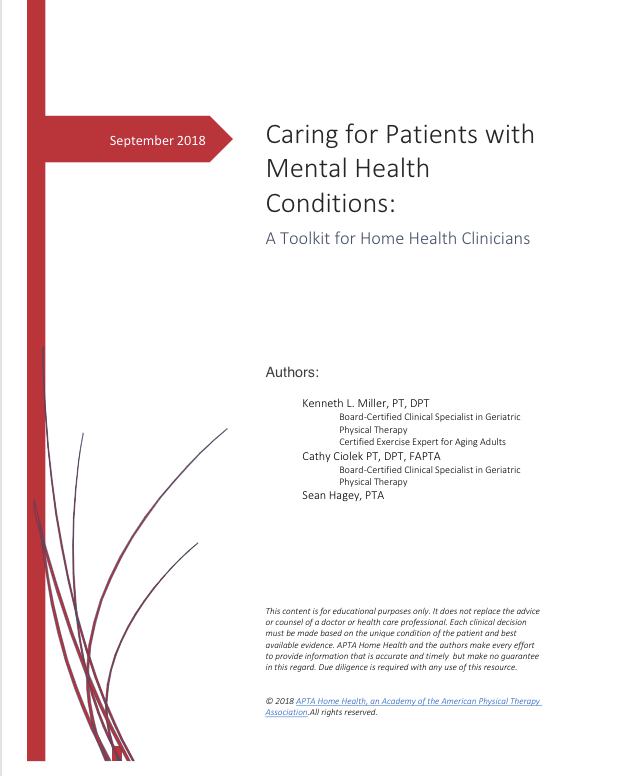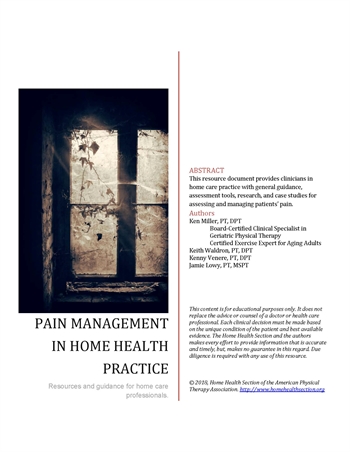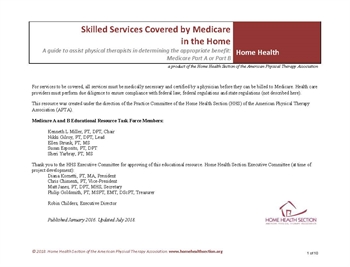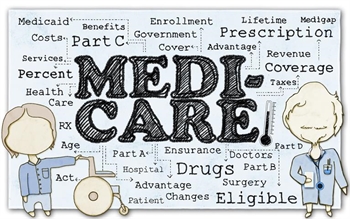APTA Home Health Practice PublicationsPlease review Terms & Conditions for E-Documents prior to download or purchase. Click the button below to login and access Members Only documents and resources. Topics include:
Not a member? Join today! CLICK HERE FOR Members Only DocumentsPublications Available to Members and Non-Members
** Please Note - We are currently out of stock on print copies. You can still purchase a print copy, however, there will be a delay in order shipping. Thank you for understanding. Much has changed in the home health landscape since the third edition of Providing Physical Therapy in the Home was published in 2014. The 4th edition includes several important revisions to its predecessor, with perhaps the most important being a shift of focus from administrative policy and procedure, compliance, and performance criteria to a focus on clinical best practices that will endure policy and payment changes. This 200+ page resource is sure to be a valuable professional tool for your practice. ..
Medication reconciliation is an important aspect of the initial and ongoing assessment for a patient receiving home health physical therapy. Medication reconciliation refers the process of creating the most accurate list of all medications a patient is taking, including drug name, dosage, frequency, and route and comparing that list against the admission, transfer, and/or discharge orders, with the goal of providing a correct list of medications to the patient at all transition points. Medication discrepancies frequently occur during care transitions from hospital to home. These discrepancies place patients at risk for adverse drug events (ADEs). Medication reconciliation is essential in managing adverse drug events and improving drug safety in older adults. It can be difficult to obtain a complete list of medications from a home health patient, and accuracy is dependent on the patients or caregiver’s ability and willingness to provide this information. The “Medication Reconciliation in Home Health Physical Therapy” resource covers challenges in home health in reconciling medications, gives tips questions to ask patients and care givers to enhance the reconciliation process, and reviews methods to breaking barriers to medication reconciliation in home health. .
This white paper reviews and applies the most recent recommendations for general physical therapy management of the home health patient with heart failure (HF) from a 2020 Clinical Practice Guideline by Shoemaker, Dias, Lefebvre, Heick, and Collins. The purpose of this white paper is to provide a digestible, accessible, thorough source of information for home health physical therapists and physical therapist assistants regarding recommended evaluation and treatment practices for patients with HF. Given that Shoemaker et al’s 2020 CPG publication was not specific to a practice setting, this work translates the recommendations for targeted use with the home health population. In addition, this work includes guidance on how to implement these best practice strategies for the home health patient with HF, while addressing other themes commonly encountered in this setting such as preventing rehospitalization, medication reconciliation and side effects, and patient engagement. Highlights of the paper include:
.
Published February 2022 Non-Member Price: The Home Health Toolbox II, for use by physical therapy practitioners and researchers, is an impressive and comprehensive aggregation of assessments across multiple domains, ranging widely from physical capacity to cognitive functioning to social factors impacting health and functioning. A selection of these assessments can give a full picture of a patient’s status in the home setting and should play an important role in characterizing a patient’s problems and challenges, developing a treatment plan and following progress over time. The value of this Toolbox is that its developers have carefully screened for instruments that will work in the home setting and describe their strengths, weaknesses, technical requirements and interpretation. This content is for educational purposes only. It does not replace the advice or counsel of a doctor or health care professional. Each clinical decision must be made based on the unique condition of the patient and best available evidence. APTA Home Health and the authors makes every effort to provide information that is accurate and timely, but, makes no guarantee in this regard. Due diligence is required with any use of this resource.
Digital Copies Only Many home health agencies are re-organizing how they utilize rehabilitation clinicians in order to provide quality care while managing the financial changes instituted by CMS. One strategy for optimizing the role of physical therapists and their respective skills is to develop Clinical Ladder and Preceptor Programs. These tools encourage best practice habits from PT staff and offer a non-traditional clinical development tract beyond management training and promotion.
The APTA Home Health Clinical Ladder and Preceptor Program Resource Guide:
This content is for educational purposes only. It does not replace the advice or counsel of a doctor or health care professional. Each clinical decision must be made based on the unique condition of the patient and best available evidence. APTA Home Health and the authors make every effort to provide information that is accurate and timely, but, make no guarantee in this regard. Due diligence is required with any use of this resource.
This 24-page toolkit from the APTA Home Health Practice Committee gives home care clinicians resources to provide optimal care for patients with mental health conditions that may impact safety and impede implementation and success of the plan of care. The mental health conditions addressed in the e-document are cognitive impairment (delirium, dementia, depression with dementia and pain with dementia), depression, and anxiety. Also included are case scenarios with decision trees for each condition. Authors: Kenneth L Miller PT, DPT; Cathy Ciolek PT, DPT, FAPTA; and Sean Hagey, PTA. This content is for educational purposes only. It does not replace the advice or counsel of a doctor or health care professional. Each clinical decision must be made based on the unique condition of the patient and best available evidence. APTA Home Health and the authors make every effort to provide information that is accurate and timely, but, make no guarantee in this regard. Due diligence is required with any use of this resource. .
This resource document provides clinicians in home care practice with general guidance, assessment tools, research, and case studies for assessing and managing patients’ pain. This content is for educational purposes only. It does not replace the advice or counsel of a doctor or health care professional. Each clinical decision must be made based on the unique condition of the patient and best available evidence. APTA Home Health and the authors make every effort to provide information that is accurate and timely, but, make no guarantee in this regard. Due diligence is required with any use of this resource. .
Revised August 2018 Skilled Services Covered by Medicare in the Home: A guide to assist physical therapists in determining the appropriate benefit: Medicare Part A or Part B. This 10-page guide created by the APTA Home Health Practice Committee provides an overview of the benefit features of Medicare Part A and Part B and is intended to assist physical therapists in identifying the appropriate benefit. Includes Centers for Medicare & Medicaid (CMS) links. Originally published in January of 2016, the current document was revised and updated in August of 2018. This content is for educational purposes only. It does not replace the advice or counsel of a doctor or health care professional. Each clinical decision must be made based on the unique condition of the patient and best available evidence. APTA Home Health and the authors make every effort to provide information that is accurate and timely, but, make no guarantee in this regard. Due diligence is required with any use of this resource. .
Many physical therapists agree that poor sleep quality is associated with impaired function and physical therapists commonly report not having any education in their entry level training or following graduation related to assessing patient sleep. Physical therapists working in home care have a unique opportunity to address sleep disorders by assessing the very locations patients use for sleeping and providing non-pharmacological interventions where appropriate. The purpose of this sleep kit is to provide resources for screening for sleep disorders and non-pharmacological interventions that physical therapists can provide in the home setting. This content is for educational purposes only. It does not replace the advice or counsel of a doctor or health care professional. Each clinical decision must be made based on the unique condition of the patient and best available evidence. APTA Home Health and the authors make every effort to provide information that is accurate and timely, but, make no guarantee in this regard. Due diligence is required with any use of this resource. .
The 28-page incontinence toolkit provides therapists with resources to manage incontinence, assist in de-prescribing inappropriate medications used for symptom control, reduce the risk of falling and improve the quality of life in the patients we serve. The toolkit includes an overview of symptoms and causes, patient education information, a decision-making tree, medication tables, and case scenarios. This content is for educational purposes only. It does not replace the advice or counsel of a doctor or health care professional. Each clinical decision must be made based on the unique condition of the patient and best available evidence. APTA Home Health and the authors make every effort to provide information that is accurate and timely, but, make no guarantee in this regard. Due diligence is required with any use of this resource. .
This 31-page electronic document (PDF) provides guidance related to determining homebound status and medical necessity. It includes case studies, and decision-making trees related to compliance with Medicare's medical necessity requirements for home care. Although this guide is intended for physical therapists and the case studies included focus on physical therapy, other therapists and therapy supervisors may find the information relevant. Case studies and decision-making trees are included for the following for purposes of providing models for common diagnoses and case complexities:
This content is for educational purposes only. It does not replace the advice or counsel of a doctor or health care professional. Each clinical decision must be made based on the unique condition of the patient and best available evidence. APTA Home Health and the authors make every effort to provide information that is accurate and timely, but, make no guarantee in this regard. Due diligence is required with any use of this resource. .
Published in May of 2017 by APTA Home Health's Practice Committee, this document provides guidance to physical therapists regarding OASIS-related resources for purposes of improving accuracy on the OASIS. Note that this is an updated version of an article previously made available through a 2012 publication titled "Practice Resource Documents for Home Health Physical Therapists". This content is for educational purposes only. It does not replace the advice or counsel of a doctor or health care professional. Each clinical decision must be made based on the unique condition of the patient and best available evidence. APTA Home Health and the authors make every effort to provide information that is accurate and timely, but, make no guarantee in this regard. Due diligence is required with any use of this resource. . EVIDENCE-BASED PRACTICE RESOURCES . |
